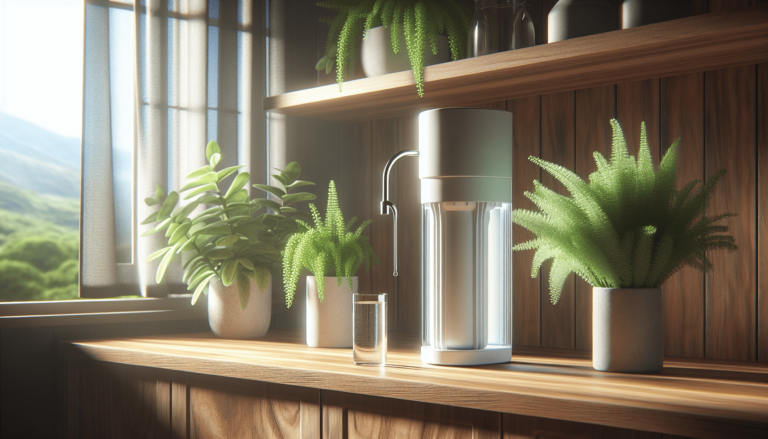Gravity vs. Faucet Filters: Best for Your Kitchen?
Are you wondering which type of water filter would be best for your kitchen? When it comes to ensuring the quality of the water flowing through your home, choosing the right filtration system can be essential in promoting health and well-being. Water filters play a crucial role in removing contaminants and providing you with clean, safe drinking water. But with so many options available, how do you decide which one suits your needs? Today, let’s chat about two popular types of water filters—gravity-fed and faucet filters—and help you decide which belongs in your kitchen.

Understanding Water Filtration
Before diving into the specifics of gravity-fed and faucet filters, it’s beneficial to understand what water filtration is and why it’s important. Water filtration systems remove impurities such as lead, chlorine, bacteria, and other harmful substances, thereby improving water quality. The filtration process can enhance taste, smell, and safety, making water healthier for consumption.
Why Choose a Water Filter?
Water quality can vary considerably depending on your location and source, with some household water supplies more prone to contaminants than others. Even if your water meets legal safety standards, it may still contain impurities that could affect your health over time. By installing a water filter, you are taking a significant step towards safeguarding your family’s health and potentially improving your water’s overall taste and smell.
Gravity-Fed Water Filters
Let’s first explore gravity-fed water filters. These types of filters operate through the natural force of gravity, allowing water to pass through a filter without the need for external power sources.
How Do Gravity-Fed Filters Work?
Gravity-fed filters typically consist of an upper chamber where you pour the water in, which then travels through a filter into a lower chamber, where it’s stored until needed. The water is literally driven by gravity through the filters, which usually use activated carbon or ceramic materials to remove impurities.
Advantages of Gravity-Fed Filters
- Simplicity and Portability: These filters are incredibly easy to use and don’t require any plumbing changes or electricity, making them perfect even during power outages or for off-grid scenarios.
- Effective Filtration: Many gravity-fed systems are capable of filtering out a wide range of contaminants, including bacteria and heavy metals.
- Cost-Effective: They tend to have a lower upfront cost compared to some advanced filtration systems and require minimal maintenance costs.
Disadvantages of Gravity-Fed Filters
- Slower Filtration Rate: Since these filters rely on gravity, they can be slower compared to other types.
- Limited Capacity: The amount of water they can filter at one go is usually limited by the size of the chambers.
Ideal Usage Scenarios for Gravity-Fed Filters
Gravity-fed filters are fantastic for anyone who needs a portable, reliable water filtration system. They’re ideal for camping, emergency preparedness, or use in an area with limited access to treated water. Families who want an inexpensive, easy-to-use solution for day-to-day water filtration may also benefit from a gravity-fed system, given its effectiveness in removing contaminants.
Faucet Water Filters
Now, let’s consider faucet filters. These systems attach directly to your kitchen faucet to provide filtered water on demand.
How Do Faucet Filters Work?
Faucet filters are installed at the end of your kitchen tap. They generally contain a filtering cartridge that water flows through when you turn on your tap, either filtering all water coming through or only when a diverter is activated.
Benefits of Faucet Filters
- Convenience: These filters provide immediate access to filtered water straight from your tap, making them highly convenient for everyday use.
- Continuous Supply: Unlike gravity-fed models, faucet filters don’t require you to fill up chambers continuously, providing an uninterrupted water supply.
- Ease of Installation: Installation usually involves simply screwing the filter onto your existing faucet, making them relatively straightforward to set up.
Drawbacks of Faucet Filters
- Potential Compatibility Issues: Some faucets may not be compatible with certain filter models, necessitating additional adjustments or fittings.
- Dependence on Water Pressure: Faucet-based systems rely on your home’s water pressure, which can impact performance if your home experiences low water pressure issues.
- Frequent Cartridge Replacements: You’ll need to replace the filter cartridges regularly, which may incur additional expenses over time.
Best Suited Applications for Faucet Filters
Faucet filters work well in homes where immediate access to filtered water is desired without the hassle of manual filling. They suit those who want a simple and relatively inexpensive method of improving water quality at home. Hectic households or anyone prioritizing convenience might find this option particularly appealing.
Comparing Gravity-Fed and Faucet Filters
Now that we’ve covered the basics of each filter type, let’s compare them directly to help you decide which one belongs in your kitchen. Here’s a side-by-side look at key factors:
| Feature | Gravity-Fed Filters | Faucet Filters |
|---|---|---|
| Installation | No installation needed, set up anywhere | Simple installation onto the faucet |
| Portability | Highly portable and versatile | Not portable, fixed to the sink area |
| Operation | Gravity-driven, no power needed | Dependent on water pressure |
| Cost | Initial lower cost, minimal upkeep | May require frequent cartridge changes |
| Speed | Slower filtering process | Quick, instant filtration |
| Capacity | Typically smaller, based on chamber size | Continuous, unlimited flow |
| Effectiveness | Efficient at removing many contaminants | Good for common tap water impurities |

Tips for Choosing the Right Filter
Here are some tips to help streamline your decision:
- Evaluate Your Water Source: Conduct a water test to understand the types of impurities present. Certain filters are better at removing specific contaminants, like lead or chlorine.
- Consider Your Household Needs: Think about the number of people in your household and water consumption rates. A high-demand home might benefit more from a faucet filter with continuous flow.
- Prioritize Features Over Brands: Look for filters that best meet your needs, quality, and budget rather than focusing solely on brands.
- Account for Budget and Long-Term Costs: While gravity-fed filters may have lower upfront costs, faucet filters might require frequent replacements. Calculate both initial expenses and ongoing costs involved.
- Space Considerations: Consider physical space limitations in your kitchen. Gravity-fed models require countertop space, while faucet filters need you to be comfortable with modifying your tap.
Maintaining Your Water Filter
Regardless of the filter type you choose, regular maintenance is crucial to keeping your system running optimally. Here’s how to care for both filter types:
Gravity-Fed Filter Maintenance
- Regular Cleaning: Clean the chambers and change filters as recommended by the manufacturer.
- Filter Replacements: Monitor when your carbon or ceramic filters need replacing to maintain effectiveness.
Faucet Filter Maintenance
- Cartridge Changes: Track cartridge life and replace it regularly, ensuring continued filtration quality.
- Check for Leaks: Keep an eye out for drips or leaks around the attachment area, which may require a simple seal adjustment or tightening.
Conclusion
Both gravity-fed and faucet water filters offer unique advantages tailored to different needs and lifestyles. If you’re drawn to the simplicity and effectiveness of a system that operates without the need for plumbing changes or electricity, gravity-fed filters may be your ideal choice. However, if convenience and speed are high on your priority list, faucet filters provide an immediate flow of filtered water with minimal effort.
Each type of filter holds potential in significantly improving your water quality. As you weigh your options, keep in mind your water needs, budget, and kitchen setup. With the right filter in place, you can enjoy the peace of mind that comes with knowing your home is equipped with safe, clean, and great-tasting water every day.
As an Amazon Associate, I earn from qualifying purchases.







